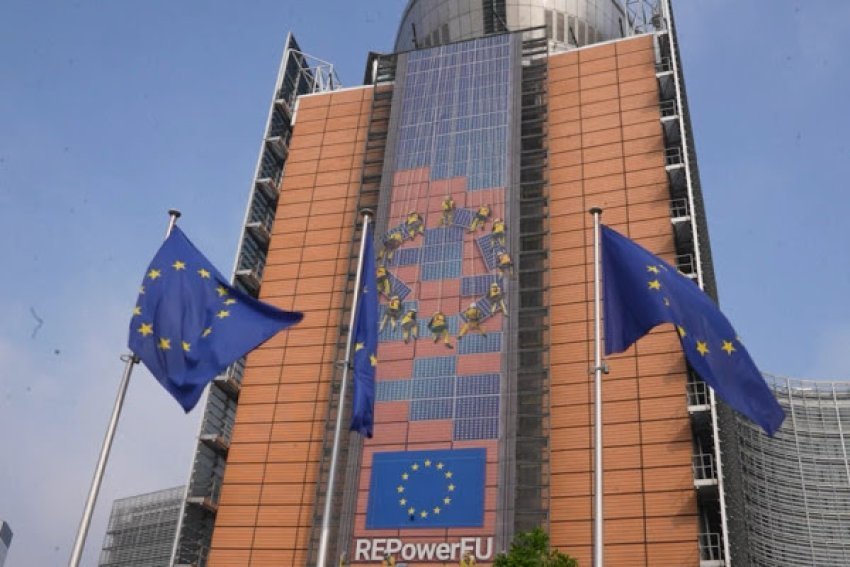The European Union (EU) measures against Kosovo, imposed in June of last year, have had a negative impact on the country’s economy. This is the assessment of the President of the Kosovo Chamber of Commerce, Lulzim Rafuna, who states that approximately 300 million euros have been blocked by the EU.
Rafuna urged the Government of Kosovo to work closely with international partners to have these measures lifted as soon as possible and to prevent the imposition of additional sanctions, which have been threatened by the European Union.
Additionally, Rafuna criticized the government for not prioritizing the economy, stating that “the economy of Kosovo is a secondary concern.”
The President of the Kosovo Chamber of Commerce also addressed the recent administrative guideline issued by the Ministry of Industry, Entrepreneurship, and Trade concerning import quotas.
Rafuna: EU Measures Harmful to the Country
“From what we have seen and from the public data available, the value of projects that could not be implemented due to the punitive measures imposed on Kosovo amounts to around 300 million euros so far. This is based on the public data we have been able to see. However, if these measures are further intensified, without a doubt, even if no additional measures are imposed, if these measures remain in force, the value of unutilized projects will continue to increase. Therefore, this is very bad and harmful to the country’s economy because these projects were intended for capital investments. They are harmful to the citizens of Kosovo because the implementation of these projects would have resulted in better welfare for the citizens. Furthermore, it is even worse for the state of Kosovo, as this does not send a positive message to foreign investors to encourage them to come to Kosovo and invest,” emphasized Rafuna.
The President of the Kosovo Chamber of Commerce has called on the Government of Kosovo to coordinate every important political decision for the country with international allies.
Rafuna: Government Should Coordinate with International Partners
“Our request is to work closely with our international partners. We need to coordinate with our partners. The best decision is one that is made in coordination with all those friends who have helped Kosovo develop and who are part of Kosovo’s history so far… We should not allow new measures to be imposed, but we should fight to remove the existing measures that have been unfairly imposed on us,” emphasized Rafuna.
According to Rafuna, the dialogue and the issue of the northern part of the country have overshadowed Kosovo’s economy. He calls for this vital sector to be prioritized.
Rafuna: Economy Should Be Prioritized
“The opening of these topics and the focus on these issues are putting the economy in second place. Our request is that the economy should be in the forefront, without neglecting these topics, but also alongside foreign policy, the rule of law, and other areas, but not at the expense of the economy. Therefore, our request is to work more in the field of the economy and improve the image through economic diplomacy. However, we have also seen with the recent law on the Tax Administration that it is not a ‘business-friendly’ law but a law that places businesses under complete control by the Tax Administration or other institutions. The government needs to work to create opportunities for businesses, not stifle them, and instead play its role in drafting good policies, good laws, favorable taxes, and thus create a good environment for attracting investments to Kosovo,” he said.
Meanwhile, the Administrative Guideline of the Ministry of Industry, Entrepreneurship, and Trade (MINT) concerning import quotas has not been well received by the Kosovo Chamber of Commerce. According to President Rafuna, the guideline lacks sufficient clarity for businesses.
Rafuna: We Do Not Know the Purpose of the Guideline and How It Should Be Implemented
“We have embraced free trade, and it would be better to allow supply and demand to regulate this issue… We have had quotas even when the SAA agreement and the CEFTA agreement were signed, and even before the SAA agreement with the EU’s unilateral decision 2000/47, which recognized Kosovo’s right to export a wide range of products to EU countries without customs duties. Even during that period, for wines, we had a set quota on how much we could export to EU countries. However, what we have seen during the working groups of this administrative guideline is that there is not enough clarity. There is not enough information provided to businesses about the purpose of the guideline and how it should be implemented… We are waiting for further clarifications on how this guideline will be implemented and why it was introduced. We still do not have an explanation to understand how it will favor businesses,” he said.
The Ministry of Industry, Entrepreneurship, and Trade states that this administrative guideline is in line with international practices, World Trade Organization agreements, and EU legislation. It is further stated that “Based on World Trade Organization principles; Import quotas can mainly be imposed for the seasonal protection of certain products.”







